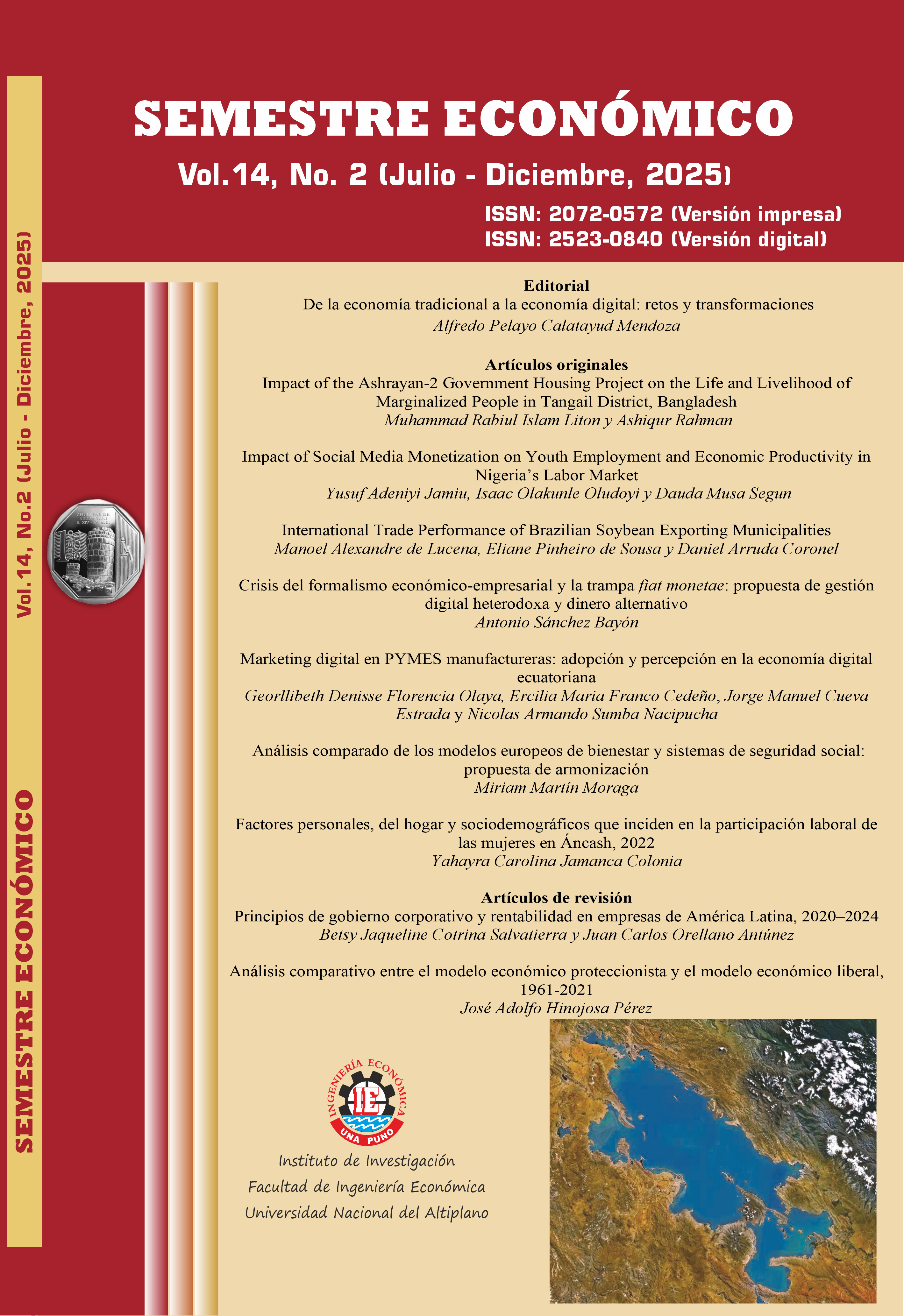Impact of Social Media Monetization on Youth Employment and Economic Productivity in Nigeria's Labor Market
DOI:
https://doi.org/10.26867/se.2025.v14i2.188Keywords:
Social Media Monetization, Youth Employmen, Economic Productivity, Nigerian Labor Market, Digital EntrepreneurshipAbstract
This study explores the impact of social media monetization on youth employment and economic productivity in Nigeria's labor market. As digital platforms like Instagram, YouTube, and TikTok offer young Nigerians opportunities for income generation, they also reshape traditional employment patterns. The research examines the dual-edged nature of social media monetization, balancing the potential for economic empowerment against the challenges of job security, income volatility, and productivity. Utilizing Multinomial Logistic Regression, the study analyzes survey data from Nigerian youth engaged in digital entrepreneurship to determine the effects on employment outcomes and economic productivity. Key findings highlight that while social media provides flexible employment opportunities, it may also divert time from other productive activities, with implications for long-term economic growth. The study concludes with policy recommendations to optimize the benefits of digital entrepreneurship while addressing its challenges, aiming to integrate these emerging work patterns into Nigeria's broader economic framework.
References
Abiodun, A., Adegbite, O., & Olanrewaju, A. (2017). Informal sector and employment generation in Nigeria. Journal of Economics and Development Studies, 5(1), 98-109.
Adejumo, G. O., & Adegbite, S. A. (2019). Digital entrepreneurship in Nigeria: An overview. African Journal of Economic Policy, 6(2), 45-62.
Ajibade, S., & Faleye, T. (2020). Digital labor markets and economic productivity in Nigeria. Nigerian Journal of Economics, 9(1), 123-140.
Autor, D. H. (2015). Why Are There Still So Many Jobs? The History and Future of Workplace Automation. Journal of Economic Perspectives, 29(3), 3-30.
Bakhshi, H., Freeman, A., & Higgs, P. (2015). The impact of digital content creation on the UK economy. NESTA Report.
Becker, G. S. (1964). Human Capital: A Theoretical and Empirical Analysis, with Special Reference to Education. University of Chicago Press.
Brynjolfsson, E., & McAfee, A. (2014). The second machine age: Work, progress, and prosperity in a time of brilliant technologies. W. W. Norton & Company.
Castells, M. (2010). The rise of the network society: The information age: Economy, society, and culture. Wiley-Blackwell.
De Stefano, V. (2016). The Rise of the "Just-in-Time Workforce": On-Demand Work, Crowdwork, and Labor Protection in the "Gig-Economy". Comparative Labor Law & Policy Journal, 37(3), 471-504.
Donovan, S. A., Bradley, D. H., & Shimabukuro, J. O. (2016). What does the gig economy mean for workers? Washington, DC: Congressional Research Service.
Edewor, P., Oladipo, S., & Salami, A. (2019). Social media and consumer behavior: Implications for traditional retail in Nigeria. Journal of Retailing and Consumer Services, 51, 76-85.
Grecu, V., & Grecu, G. (2021). The Gig Economy—a Labor Market Vulnerability Factor. Studia Universitatis „Vasile Goldis” Arad – Economics Series, 31(4), 54-72. https://doi.org/10.2478/sbe-2021-0055
Helsper, E. J., & Reisdorf, B. C. (2016). A global perspective on the digital divide: The role of social media in bridging the gap. International Journal of Communication, 10(1-20).
Huerta de Soto, J. (2024). The theory of dynamic efficiency (tech-entrepreneurship). Zenodo. https://doi.org/10.5281/zenodo.14908364
Kässi, O., & Lehdonvirta, V. (2018). Online labour index: Measuring the online gig economy for policy and research. Technological Forecasting and Social Change, 137, 241-248.
Kenney, M., & Zysman, J. (2016). The rise of the platform economy. Issues in Science and Technology, 32(3), 61-69.
Lee, I., Lee, K. S., & Lee, M. (2015). The impact of digital marketing on traditional marketing strategies. Journal of Business Research, 68(9), 1856-1860.
Nduka, U. A., Amadi, C., & Onyeka, E. (2020). Social media and youth employment in Nigeria: Opportunities and challenges. African Journal of Social Sciences, 11(2), 102-118.
Ogundele, T., & Opeoluwa, A. (2018). Social media as a complement to traditional employment: A case study of Nigeria. Journal of African Media Studies, 10(3), 345-361.
Oladipo, M. O., & Adebayo, T. A. (2018). Informal work and productivity in Nigeria. Nigerian Journal of Economic Studies, 8(1), 91-107.
Oyemomi, O., Irivwieri, E., & Ezeh, I. (2019). Digital entrepreneurship and job creation in Nigeria: An exploratory study. International Journal of Entrepreneurship, 23(1), 1-12.
Pew Research Center. (2019). The state of social media in Nigeria: Trends and implications. Pew Research Center Report.
Solow, R. M. (1956). A Contribution to the Theory of Economic Growth. The Quarterly Journal of Economics, 70(1), 65-94.
Utz, S. (2022). The Gig Economy: A Critical Review of the Literature. Management Review and Analysis, 11(8), 23-42. https://doi.org/10.18103/mra.v11i8.4200
World Bank. (2019). World Development Report 2019: The Changing Nature of Work. Washington, DC: World Bank.
Zalega, T. (2018). The socio-economic impacts of the gig economy: Evidence from developing countries. Development Studies Journal, 15(2), 250-270.
Downloads
Published
Issue
Section
License
Copyright (c) 2025 Jamiu Adenyi Yusuf, Isaac Olakunle Oludoyi, Segun Musa Dauda

This work is licensed under a Creative Commons Attribution 4.0 International License.














